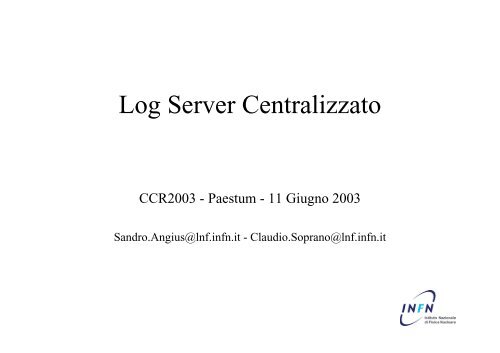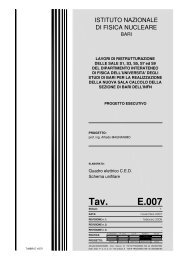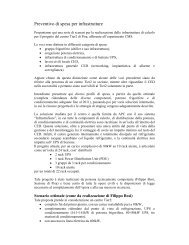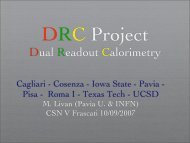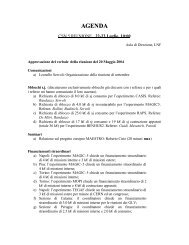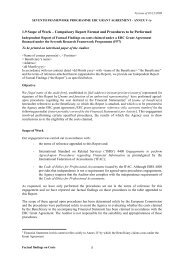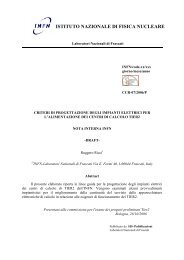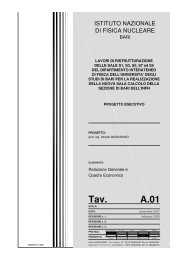Log Server Centralizzato - Infn
Log Server Centralizzato - Infn
Log Server Centralizzato - Infn
You also want an ePaper? Increase the reach of your titles
YUMPU automatically turns print PDFs into web optimized ePapers that Google loves.
<strong>Log</strong> <strong>Server</strong> <strong>Centralizzato</strong><br />
CCR2003 - Paestum - 11 Giugno 2003<br />
Sandro.Angius@lnf.infn.it - Claudio.Soprano@lnf.infn.it
<strong>Server</strong>, Farm, Apparati di Rete:<br />
tutti generano log sul loro funzionamento!<br />
CCR2003 - <strong>Log</strong> <strong>Server</strong> <strong>Centralizzato</strong> - 11 Giugno 2003 2
Come vengono prodotti i log?<br />
• I sistemi unix usano il demone standard syslogd<br />
(rfc3164) per definire cosa e dove inviare i messaggi<br />
generati dai servizi e dalle applicazioni<br />
• La maggior parte degli apparati di rete e’ capace di<br />
inviare i propri messaggi di diagnostica tramite il<br />
protocollo syslog<br />
• Non tutte le applicazioni pero’ supportano l’invio dei<br />
messaggi via syslog<br />
• Generalmente i log risiedono sul sistema che li genera!<br />
CCR2003 - <strong>Log</strong> <strong>Server</strong> <strong>Centralizzato</strong> - 11 Giugno 2003 3
<strong>Log</strong> NON centralizzati significa:<br />
• Definire su ogni sistema le politiche per la gestione dei log<br />
– Cosa, Come, Dove e per quanto tempo mantenere i log<br />
• Dover accedere sul sistema interessato per analizzare i log<br />
– Nel caso di servizi ridondati (es: http, proxy, smtp, etc.) occorre verificare i log su tutti i<br />
server che offrono lo stesso servizio<br />
• Maggiore difficolta’ nell’analisi, report e archiviazione<br />
• Possibili “DOS” che puntano al blocco di un servizio per esaurimento<br />
dello spazio disco (se i log sono sul disco sistema…)<br />
• I log sono modificabili da eventuali intrusi…<br />
• Ogni cambio di politica comporta dover riconfigurare tutti i sistemi!<br />
CCR2003 - <strong>Log</strong> <strong>Server</strong> <strong>Centralizzato</strong> - 11 Giugno 2003 4
Come centralizzare ?<br />
CCR2003 - <strong>Log</strong> <strong>Server</strong> <strong>Centralizzato</strong> - 11 Giugno 2003 5
Un primo passo: syslog su sistema dedicato<br />
514/UDP<br />
Syslogd<br />
syslog.conf<br />
# syslog.conf dei client<br />
*.* @syslogsrv.lnf.infn.it<br />
# Estratto da un possibile syslog.conf<br />
# per un syslogd server centrale<br />
authpriv.*<br />
mail.*<br />
cron.*<br />
uucp,news.crit<br />
local7.*<br />
local6.*<br />
local5.*<br />
/var/log/secure<br />
/var/log/maillog<br />
/var/log/cron<br />
/var/log/spooler<br />
/var/log/boot.log<br />
/var/log/myapps.log<br />
/var/log/others.log<br />
.. omissis ..<br />
CCR2003 - <strong>Log</strong> <strong>Server</strong> <strong>Centralizzato</strong> - 11 Giugno 2003 6
Syslog: Formato Messaggi (RFC3164)<br />
Syslog Packet (massimo 1024 bytes)<br />
Priority<br />
(3..5 bytes)<br />
Header<br />
Message<br />
Timestamp Hostname Tag Content<br />
• Priority = 8 * Facility + Severity<br />
• Header<br />
– Timestamp: Data e Ora del messaggio<br />
– Hostname: Nome dell’host origine del messaggio<br />
• Message<br />
– Tag: Programma origine del messaggio<br />
– Content: Messaggio informativo<br />
CCR2003 - <strong>Log</strong> <strong>Server</strong> <strong>Centralizzato</strong> - 11 Giugno 2003 7
etc/syslog.conf standard<br />
# Configuration file example for syslogd<br />
# Store critical stuff in critical<br />
*.=crit;kern.none<br />
/var/adm/critical<br />
# Kernel messages are first, stored in the kernel<br />
file,<br />
# critical messages and higher ones also go to another<br />
# host and to the console<br />
#<br />
kern.*<br />
/var/adm/kernel<br />
kern.crit<br />
@finlandia<br />
kern.crit<br />
/dev/console<br />
kern.info;kern.!err<br />
/var/adm/krninfo<br />
# The tcp wrapper loggs with mail.info, we display<br />
# all the connections on tty12<br />
#<br />
mail.=info /dev/tty12<br />
# Store all mail concerning stuff in a file<br />
#<br />
mail.*;mail.!=info<br />
/var/adm/mail<br />
# <strong>Log</strong> all mail.info and news.info messages to info<br />
#<br />
mail,news.=info/var/adm/info<br />
# <strong>Log</strong> info and notice messages to messages file<br />
#<br />
*.=info;*.=notice;\<br />
mail.none /var/log/messages<br />
# <strong>Log</strong> info messages to messages file<br />
#<br />
*.=info;\<br />
mail,news.none /var/log/messages<br />
# Emergency messages will be displayed using wall<br />
#<br />
*.=emerg *<br />
# Messages of the priority alert will be directed<br />
# to the operator<br />
#<br />
*.alert root,joey<br />
*.* @finlandia<br />
CCR2003 - <strong>Log</strong> <strong>Server</strong> <strong>Centralizzato</strong> - 11 Giugno 2003 8
Syslog standard: le limitazioni<br />
• Un solo “net source” (udp/514) oltre al /dev/log<br />
• Alcune implementazioni prevedono l’uso di socket aggiuntive<br />
• “Destinazioni” limitate<br />
• “solo” 20 “facilities” di cui solo 8 non riservate<br />
– kern, user, mail, daemon, auth, authpriv, syslog, lpr, news, uucp, cron, ftp<br />
– General Purpose: local0 … local7<br />
• 8 “severities”<br />
– emerg, alert, crit, err, warning, notice, info, debug<br />
• Alcune implementazioni prevedono l’invio ad una pipe/fifo<br />
• Nessuna possibilita’ di filtrare/catalogare i log in base al<br />
contenuto<br />
CCR2003 - <strong>Log</strong> <strong>Server</strong> <strong>Centralizzato</strong> - 11 Giugno 2003 9
Un possibile passo successivo:<br />
uso di un parser per i log<br />
514/UDP<br />
Syslogd<br />
syslogd.conf<br />
<strong>Log</strong><br />
Parser<br />
CCR2003 - <strong>Log</strong> <strong>Server</strong> <strong>Centralizzato</strong> - 11 Giugno 2003 10
Oppure: Syslog Next Generation<br />
514/UDP<br />
TCP/UDP Ports<br />
Pipe / FIFO<br />
Syslogd<br />
Next Generation<br />
Internal<br />
syslog-ng.conf<br />
TCP<br />
UDP<br />
Pipe<br />
FIFO<br />
CCR2003 - <strong>Log</strong> <strong>Server</strong> <strong>Centralizzato</strong> - 11 Giugno 2003 11
Syslog NG<br />
• Compatibile con il protocollo di syslogd<br />
• “Sources” :<br />
– udp/514, fifo/pipe, file, tcp/udp, internal,<br />
unix-stream/dgram, sun-stream<br />
• Possibili output:<br />
– file, fifo/pipe, tcp/udp, program, usertty, unix-stream/dgram<br />
CCR2003 - <strong>Log</strong> <strong>Server</strong> <strong>Centralizzato</strong> - 11 Giugno 2003 12
Syslog NG: Filtri<br />
Priority<br />
(3..5 bytes)<br />
Syslog Packet (massimo 1024 bytes)<br />
Header<br />
Message<br />
Timestamp Hostname Tag Content<br />
Per facility(faciliy[,facility]) e level(pri[,pri1..pri2[,pri3]])<br />
Per nodo: host(regexp)<br />
Per applicativo: program(regexp)<br />
Per contenuto: match(regexp)<br />
CCR2003 - <strong>Log</strong> <strong>Server</strong> <strong>Centralizzato</strong> - 11 Giugno 2003 13
Syslog NG: Message Paths<br />
Opzioni Generali<br />
Opzioni “source” Opzioni “filter” Opz. “destination”<br />
Source<br />
Source<br />
Source<br />
Source<br />
F<br />
i<br />
l<br />
t<br />
e<br />
r<br />
F<br />
i<br />
l<br />
t<br />
e<br />
r<br />
F<br />
i<br />
l<br />
t<br />
e<br />
r<br />
F<br />
i<br />
l<br />
t<br />
e<br />
r<br />
F<br />
i<br />
l<br />
t<br />
e<br />
r<br />
Destination<br />
Destination<br />
Destination<br />
Destination<br />
Destination<br />
Destination<br />
Destination<br />
M e s s a g e P a t h s<br />
• In Syslog NG si definiscono, tramite le statement log, dei “Message paths”, costituiti da:<br />
– uno o piu’ “sorgenti” (statement source)<br />
– una o piu’ regole di “filtro” (statement filter)<br />
– una o piu’ “destinazioni” (statement destination)<br />
CCR2003 - <strong>Log</strong> <strong>Server</strong> <strong>Centralizzato</strong> - 11 Giugno 2003 14
Syslog NG: Sintassi<br />
• 5 gli statement utilizzati per la configurazione: source, filter, destination, log, options<br />
• source { source-driver(params); source-driver(params); ... };<br />
• filter { expression; };<br />
• destination { destination-driver(params); destination-driver(params); ... };<br />
• log { source(s1); source(s2); ... filter(f1); filter(f2); …<br />
destination(d1); destination(d2); ... flags(flag1[, flag2...]); };<br />
• options { option1(params); option2(params); ... };<br />
CCR2003 - <strong>Log</strong> <strong>Server</strong> <strong>Centralizzato</strong> - 11 Giugno 2003 15
Syslog NG: Macro e Opzioni<br />
• L’output su file permette di usare una serie di<br />
macro che facilitano la catalogazione<br />
• Macro (output su file):<br />
– DATE, DAY, FACILITY, FULLDATE, FULLHOST, HOST, HOUR ,ISODATE, MIN,<br />
MONTH, MSG or MESSAGE, PRIORITY or LEVEL, PROGRAM, SEC, TAG, TZ,<br />
TZOFFSET, WEEKDAY, YEAR<br />
• Opzioni (output su file):<br />
– create_dirs, dir_perm, global, fsync, group, log_fifo_size, owner, perm, remove_if_older<br />
num, sync_freq, template, template_escape<br />
CCR2003 - <strong>Log</strong> <strong>Server</strong> <strong>Centralizzato</strong> - 11 Giugno 2003 16
Syslog NG: un mini esempio (1/4)<br />
options {<br />
create_dirs (no); dir_perm(0755); dns_cache(yes);<br />
use_dns(yes);<br />
log_fifo_size(2048); log_msg_size(8192);<br />
long_hostnames(on); use_fqdn(yes); perm(0644);<br />
sync(0); time_reopen (10);<br />
};<br />
source src {<br />
unix-stream("/dev/log");<br />
internal();<br />
pipe("/proc/kmsg");<br />
};<br />
source net { udp(); };<br />
source special {tcp(ip(127.0.0.1) port(4800) keep-alive(yes)); };<br />
CCR2003 - <strong>Log</strong> <strong>Server</strong> <strong>Centralizzato</strong> - 11 Giugno 2003 17
Syslog NG: un mini esempio (2/4)<br />
destination console { usertty("root"); };<br />
destination smtprelay { file("/var/log/mailing/smtprelay.log"); };<br />
destination smtpclient { file("/var/log/mailing/smtpclient.log"); };<br />
destination imap { file("/var/log/mailing/imap.log"); };<br />
destination l_messages { file("/var/log/logsrv/messages.log"); };<br />
destination example {<br />
file(“/var/log/example/$HOST/$YEAR/$MONTH/$DAY/$FACILITY.log<br />
owner(root) group(root) perm(0600) create_dirs(yes) dir_perm(0700));<br />
};<br />
destination sms { program("/usr/custom/bin/sendsms +393xxxzzzyyyy“); };<br />
destination swatch { program("/usr/bin/swatch --read-pipe=\"cat /dev/fd/0\"");};<br />
destination other { udp(“192.169.12.234” port(514)); };<br />
destination network { file("/var/log/net/$HOST/gen.log" create_dirs(yes)); };<br />
destination _notmatched_ { file("/var/log/notmatched.log"); };<br />
CCR2003 - <strong>Log</strong> <strong>Server</strong> <strong>Centralizzato</strong> - 11 Giugno 2003 18
Syslog NG: un mini esempio (3/4)<br />
filter f_mail { facility(mail); };<br />
filter f_smtprelay { host("smtp1") or host(“smtp2"); };<br />
filter f_smtpclient { host(“imap1") or host(“wmail") or host(“serv3"); };<br />
filter f_sendmail { program("sendmail"); };<br />
filter f_imap { program("imapd"); };<br />
filter f_network<br />
};<br />
{ host("swcalc1") or host("swcalc2") or<br />
host("swcalcfarm1") or host("swaeta") or<br />
host("swaetb"); or … etc etc …<br />
filter f_diskmsg { match(“disk fault on”); };<br />
CCR2003 - <strong>Log</strong> <strong>Server</strong> <strong>Centralizzato</strong> - 11 Giugno 2003 19
Syslog NG: un mini esempio (4/4)<br />
log { source(src); filter(f_emergency); destination(console); };<br />
log { source(src);<br />
destination(l_messages);flags(final);};<br />
log { source(net); filter(f_network); destination(network); flags(final);};<br />
log { source(net); filter(f_diskmsg); destination(sms);};<br />
log { source(net); filter(f_smtpclient); filter(f_imap);<br />
destination(imap);<br />
flags(final);};<br />
log { source(net); filter(f_smtpclient); filter(f_sendmail);<br />
destination(smtpclient);flags(final);};<br />
log { source(net); filter(f_smtprelay); filter(f_sendmail);<br />
destination(smtprelay); flags(final);};<br />
log { source(net); destination(example); flags(final);};<br />
log { source(net); destination(_notmatched_); };<br />
CCR2003 - <strong>Log</strong> <strong>Server</strong> <strong>Centralizzato</strong> - 11 Giugno 2003 20
Come inviare i log?<br />
• Non tutte le applicazioni hanno la possibilita’ di ridirigere<br />
i loro log verso un server tipo syslog!<br />
– Ma tutti scrivono dei file o possono indirizzare delle pipe/fifo…<br />
• Si puo’ usare il comando “logger” per inviare i messaggi<br />
verso syslog:<br />
– tail -f /var/log/squidaccess.log --lines=0 --follow=name |<br />
logger -p local6.info -t squid<br />
– Oppure “|/usr/bin/logger -p local6.info -t myappl –i”<br />
se l’applicazione puo’ scrivere direttamente su pipe/fifo<br />
CCR2003 - <strong>Log</strong> <strong>Server</strong> <strong>Centralizzato</strong> - 11 Giugno 2003 21
Generare log da applicazioni “C”<br />
#include <br />
char *ident = "MyApplication";<br />
int syslogopt = LOG_PID;<br />
int facility = LOG_USER;<br />
openlog(ident, syslogopt, facility);<br />
char *sysmsg = "Info via syslog";<br />
int priority = LOG_ERR | LOG_USER;<br />
syslog(priority, sysmsg);<br />
closelog();<br />
CCR2003 - <strong>Log</strong> <strong>Server</strong> <strong>Centralizzato</strong> - 11 Giugno 2003 22
Generare log da applicazioni “Perl”<br />
use Sys::Syslog;<br />
$ident = “MyApplication”;<br />
openlog($ident, ’pid’, ’user’);<br />
syslog(’mail|warning’, ’this is a test: %d’, time);<br />
closelog();<br />
CCR2003 - <strong>Log</strong> <strong>Server</strong> <strong>Centralizzato</strong> - 11 Giugno 2003 23
Dai log ai DB via SQL<br />
• Syslog NG permette di scrivere i logs su <strong>Server</strong> SQL<br />
usando delle “destination” di tipo pipe/fifo e dei<br />
“templates” (versione 1.5 e successive)<br />
• <strong>Server</strong> SQL gia’ implementati tramite “template” creati da<br />
utenti:<br />
– Mysql<br />
– Oracle<br />
– PostgreSQL<br />
CCR2003 - <strong>Log</strong> <strong>Server</strong> <strong>Centralizzato</strong> - 11 Giugno 2003 24
Da Syslog NG a MySql <strong>Server</strong>(1/2)<br />
Da una tabella:<br />
CREATE DATABASE syslog;<br />
USE syslog;<br />
CREATE TABLE logs (<br />
host varchar(32) default NULL, facility varchar(10) default NULL,<br />
priority varchar(10) default NULL, level varchar(10) default NULL,<br />
tag varchar(10) default NULL, date date default NULL,<br />
time time default NULL,<br />
program varchar(15) default NULL,<br />
msg text, seq int(10) unsigned NOT NULL auto_increment,<br />
PRIMARY KEY (seq), KEY host (host), KEY seq (seq), KEY program (program),<br />
KEY time (time), KEY date (date), KEY priority (priority),<br />
KEY facility (facility)<br />
) TYPE=MyISAM;<br />
E per tramite di una pipe:<br />
mkfifo /tmp/mysql.pipe<br />
mysql -u theuserid --password=thepassword syslogdb < /tmp/mysql.pipe<br />
CCR2003 - <strong>Log</strong> <strong>Server</strong> <strong>Centralizzato</strong> - 11 Giugno 2003 25
Da Syslog NG a MySql <strong>Server</strong>(2/2)<br />
Puo’ essere usata la seguente destination pipe:<br />
destination d_mysql {<br />
pipe("/tmp/mysql.pipe"<br />
template("INSERT INTO logs (host, facility, priority,<br />
level, tag, date, time, program, msg) VALUES( '$HOST',<br />
'$FACILITY', '$PRIORITY', '$LEVEL', '$TAG',<br />
'$YEAR-$MONTH-$DAY', '$HOUR:$MIN:$SEC',<br />
'$PROGRAM', '$MSG' );\n")<br />
};<br />
);<br />
template-escape(yes)<br />
CCR2003 - <strong>Log</strong> <strong>Server</strong> <strong>Centralizzato</strong> - 11 Giugno 2003 26
Da Syslog NG a Oracle <strong>Server</strong><br />
destination d_oracle {<br />
pipe("/dev/ora.pipe"<br />
template("INSERT INTO logs (LL_HOST, LL_facility,<br />
LL_priority, LL_level, LL_tag, LL_DATE, LL_program, LL_msg)<br />
VALUES ( '$HOST', '$FACILILITY', '$PRIORITY', '$LEVEL',<br />
'$TAG', to_date('$YEAR.$MONTH.$DAY $HOUR:$MIN:$SEC',<br />
'yyyy.mm.dd hh24:mi:ss'), '$PROGRAM', substr('$MSG',1,511));<br />
\n COMMIT;\n")<br />
};<br />
);<br />
template-escape(yes)<br />
Per lo script di comunicazione con Oracle: http://vermeer.org/syslog/scripts/<br />
CCR2003 - <strong>Log</strong> <strong>Server</strong> <strong>Centralizzato</strong> - 11 Giugno 2003 27
Da Syslog NG a PostgreSQL<br />
destination d_postgres {<br />
file("/spool/syslog2pgsql/log.$YEAR.$MONTH.$DAY.$HOUR.$MIN.$SEC"<br />
template("INSERT INTO msg_table VALUES \( '$R_ISODATE',<br />
'$S_ISODATE', '$HOST', '$FACILITY', '$PRIORITY',<br />
'$MSG'\)\;\n")<br />
template_escape(yes)<br />
};<br />
);<br />
owner(postgres)<br />
Per lo script di comunicazione con PostgreSQL: http://www.umialumni.com/~ben/SYSLOG-DOC.html<br />
CCR2003 - <strong>Log</strong> <strong>Server</strong> <strong>Centralizzato</strong> - 11 Giugno 2003 28
Considerazioni<br />
• Il log server centrale DEVE essere molto sicuro!<br />
• Attenzione all’uso della macro $PROGRAM<br />
– Puo’ essere usata per produrre un “DOS” !<br />
• L’uso corretto delle macro puo’ rendere superfluo il<br />
“logrotate” dei file<br />
• Considerare l’uso di “tcp” invece di “udp” per i messaggi<br />
di log che non devono essere assolutamente “persi”<br />
• Rendere “poco” visibile il log server centrale<br />
– Mantenere i log (anche) in locale!<br />
CCR2003 - <strong>Log</strong> <strong>Server</strong> <strong>Centralizzato</strong> - 11 Giugno 2003 29
<strong>Log</strong> <strong>Server</strong>: quanto chiuso?<br />
Sources<br />
SyslogNG<br />
(Archive)<br />
SyslogNG<br />
(Monitor)<br />
TTY<br />
SSH<br />
• Sistema “sicuro” == Sistema spento e scollegato dalla rete!<br />
• Occorre un compromesso, ad esempio:<br />
• “Adeguata” protezione dei server “Sources”<br />
• Creazione di un log server (Archive) accessibile solo da console e che preveda<br />
la scrittura dei log su supporti WORM.<br />
• <strong>Log</strong> server in cascata (Monitor) per la normale attivita’ di controllo<br />
CCR2003 - <strong>Log</strong> <strong>Server</strong> <strong>Centralizzato</strong> - 11 Giugno 2003 30
Riferimenti<br />
• http://www.balabit.com/products/syslog_ng/<br />
– Versione attuale: 1.6.0rc3<br />
– http://www.balabit.com/downloads/syslog-ng/<br />
• RFC 3164<br />
– http://www.ietf.org/rfc/rfc3164.txt?number=3164<br />
• Mailing list:<br />
– https://lists.balabit.hu/mailman/listinfo/syslog-ng<br />
• FAQ:<br />
– http://www.campin.net/syslog-ng/faq.html<br />
CCR2003 - <strong>Log</strong> <strong>Server</strong> <strong>Centralizzato</strong> - 11 Giugno 2003 31
Domande ?<br />
http://www.lnf.infn.it/~angius/logsrv.pdf<br />
Sandro.Angius@lnf.infn.it - Claudio.Soprano@lnf.infn.it


